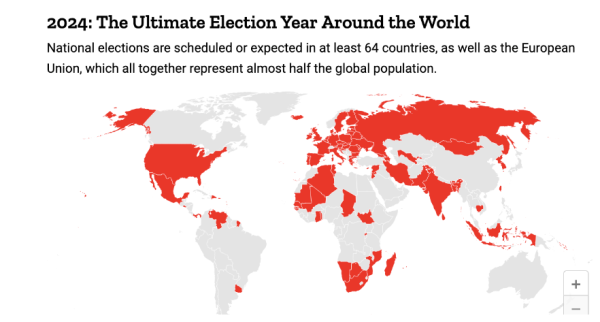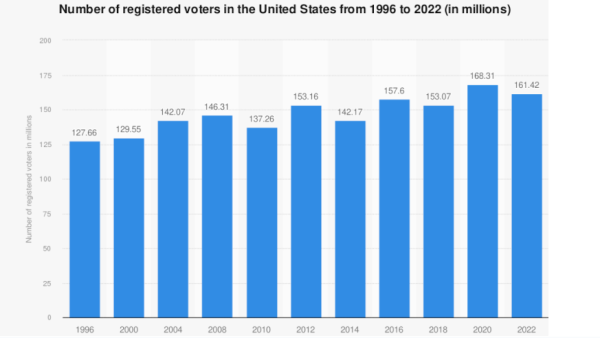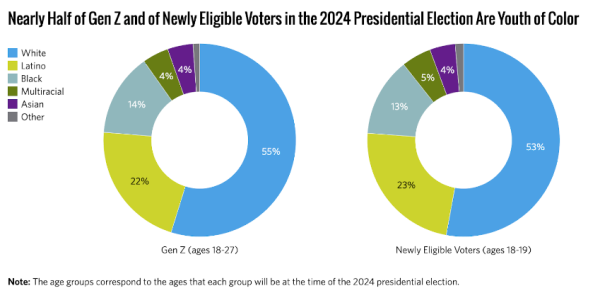“Elections are no guarantee of democracy. That much we know from who holds them. Even full-blown tyrants crave the legitimacy that, in the modern era, can be provided only by the ballot box—margins of victory doubling as one more tool of intimidation. But it’s also true that democracy does not exist without elections (Astha Rajvanshi and Yasmeen Serhan, Jan 10, 2024, Time Magazine).
We are nearing the 2024 primaries, and I cannot help but think that many of us in high school will be of the voting age in the 2028 elections. As someone who grew up hearing voting cannot be taken for granted because it was a hard-won battle, I look forward to embracing “true” citizenship in a few years. The eligible voters in the 2024 election, then, have an enormous responsibility to leave us and my generation with a firmly grounded democracy.
Jill Lawless’s recent article in the Associated Press discusses the importance of 2024 worldwide elections, which will “test even the most robust democracies”. Thomas Carothers, co-director of the Carnegie Endowment for International Peace’s Democracy, Conflict, and Governance Program, writes that in 2024, “a dizzyingly diverse array of countries”—the oldest (USA), the largest (India), the smallest (Palau) democracies in the world will witness elections. Elections will also take place in the UK, Russia, Pakistan, South Africa, and Iran.

Source: Time Magazine (https://time.com/6550920/world-elections-2024/)
2024 America Votes
The 2024 US presidential election news is replete with the agonizing political reality that democracy itself is on the ballot. A poll by the Associated Press-NORC Center for Public Affairs Research found that 62% of American adults believe American democracy is at stake.
Concerns about election security, the legitimacy of the front runners, and a shrinking voter pool are pulsating across the country — among the Democrats, the Republicans, and the Independents alike. The January 31st, 2024, Quinnipiac University poll suggests that the 2024 presidential election will likely be a “repeat of the 2020 race between President Joe Biden and former President Donald Trump.” Preserving democracy, the economy, and immigration are significant issues in poll findings.
Who are American Voters- A Demographic Snapshot
The age factor is skirting around a likely rematch between President Biden and former President Trump. Biden, now eighty-one, will most likely take on seventy-seven-year-old Trump; both have been cast as “Grumpy Old Men” by Republican candidate Nikki Haley. While the pun has a problematic ageist undertone, the more significant questions surrounding the candidates’ age and their voters cannot be ignored. There were 161.42 million registered voters in 2022, a marginal decrease from 168.31 in 2020.

U.S. number of registered voters 1996-2022, Published by Statista Research Department, Jan 12, 2024
According to the Brooking Institution, more than half the eligible voters in November 2024 will be under 45. “The Millennial and Plural (Gen Z) generations, who together make up almost all of this age cohort, rank climate change and abortion among their top three issues” (Morley Winograd, Michael Hais, and Doug Ross, August 29, 2023).

Source: Alberto Medina, Sara Suzuki , Peter de Guzman, Lily Feng, Katie Hilton, Tufts University Tisch College · CIRCLE, CIRCLE analysis of 2021 Census American Community Survey data
Issues at Stake?
The uncertainty surrounding the candidates cannot be missed. President Biden faces increasing scrutiny due to inflation (though lower since he took office), the Russo-Ukrainian War, and the Israel-Palestine conflict. On the other hand, it is puzzling to see how former President Trump, with his cases, indictments, and autocratic narrative, can garner the support of his base. The uncertainty is deeper. “While concerns about Biden are centered on his age, Trump has increasingly embraced authoritarian messages that serve as clear warnings of his plans to dismantle democratic norms if he returns to the White House” (PBS, January 2, 2024).
Voter perceptions of the economy will be critical in the November elections. Are economic indicators like low employment and high employment generation enough to alleviate day-to-day American concerns regarding inflation, cost of living, and grocery store bills?
American foreign policy, regarding Ukraine and Israel-Palestine, might play a role, though immigration could yet again be a rallying point with the Republican base.
How will Americans respond to book bans and anti-trans legislation that have squarely put educational institutions in the political sphere? What shocked me was that book and curriculum-banning initiatives were not just in distant Florida but also here in New York State. Jennifer Nadrus’s August 1, 2023 article titled The New York State Bar Association Examines Book Banning sheds light on the movement to ban sexuality and race-related books from school libraries in New York. Such initiatives should have a chilling effect on all book lovers who value reading, learning, inclusion, and tolerance.
Since Dobbs v. Jackson Women’s Health Organization 2022 Supreme Court decision and the overturning of Roe v. Wade, “every state ballot measure on abortion rights has come out in favor of abortion rights, even in red states like Kansas, Kentucky and Ohio. On top of that, the GOP’s opposition to abortion rights has been blamed for Republican under-performance in the 2022 midterms” (Danielle Kurtzleben and Lexie Schapitl, November 17, 2023, NPR). How will the younger voters view the role of the Supreme Court in determining women’s reproductive rights?
Ultimately, in the November 2024 elections, democracy and, as Jill Lawless states, “human rights, economy, international relations and prospects for peace in a volatile world” are all at stake.
